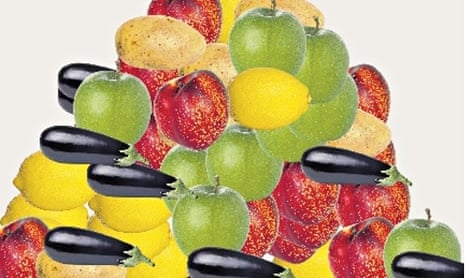Six weeks after Moscow responded to EU sanctions against Russian banks and businesses by banning all imports of fresh produce from Europe, fruit and vegetable growers across the continent are beginning to feel the effects. Total European farm exports to Russia are worth some €11bn a year, with 29% of all fresh fruit and veg grown in the union and 33% of all cheese finding its way to the Russian market. Copa-Cogeca, the umbrella group representing European farmers, says prices in both sectors have fallen by as much as 80% in some countries. It is calling for urgent help from Brussels: funds to compensate growers facing difficulties, but also action to help cut the red tape and trade regulations that can prevent European growers from selling into alternative world markets in south America, north Africa and the far east.
In the meantime, though, fruit is withering on trees and vegetables are rotting in the ground.
Poland
Polish apples are among the worst affected. Last year, Polish growers sold around €840m of fresh produce to Russia, including 700,000 tonnes of apples – a quarter of its entire crop. According to the Polish Fruit Union, prices have fallen so far that farmers, assuming they can sell, are only just covering their costs. And the knock-on effect of thousands of tonnes of cheap Polish apples flooding on to western European markets is starting to hurt growers in France, too. While touting their wares in countries as far afield as Algeria, Taiwan, India and Singapore, Poland’s farmers have high hopes of persuading American consumers to buy Polish “Freedom Apples”.
Greece
Greece exported 160,000 tonnes of fruit to Russia last year, worth around €180m to the country’s struggling economy. But when 250 truckloads of peaches and nectarines on their way to Russia were turned back from the border in August, the produce either rotted or was sold at knockdown prices to buyers in countries on the way back. Incofruit-Hellas, the Greek fruit export association, says it is now seriously worried that oversupply will end up hitting the entire fresh produce market at a time when Greece desperately needs the money.
Netherlands
Dutch fruit and vegetable sales to Russia were worth some €600m in 2013, says the Frugi Venta trade association – which represents 420 Dutch companies. But prices for some products have now fallen by 75-80%, and hundreds of trucks have been turned back. Growers in Holland fear prices for aubergines, peppers, tomatoes and cucumbers will collapse within months, while some 900 hectares of Dutch fruit orchards – particularly pears – may be left unpicked this autumn because sale prices will not cover the cost of harvesting.
Spain
The Spanish lemon growers’ organisation Ailimpo is confident Moscow’s ban should not affect the early part of its season, since lemon exports to Russia generally get underway in March and sales there only represent about 3% of Spain’s total output. But the association is still pressing Brussels to include lemons in the list of products covered by compensation schemes “to give a positive signal to growers that aid is available should problems arise, and to avoid buyers exploiting the ban by introducing speculative pricing”.
Lithuania
The small Baltic state is the second-biggest EU exporter of fresh fruit and nuts to Russia after Poland, with exports worth €309m in 2013, and the biggest exporter of fresh vegetables, worth €340m: the country’s food exports to Russia account for a daunting 2.7% of its GDP. Lithuanian potato producers are particularly hard hit; around a third of their total crop is generally sold on Russian markets.

Comments (…)
Sign in or create your Guardian account to join the discussion